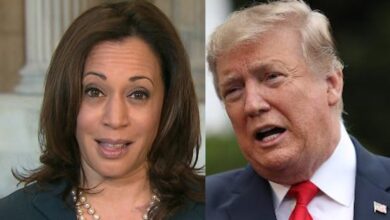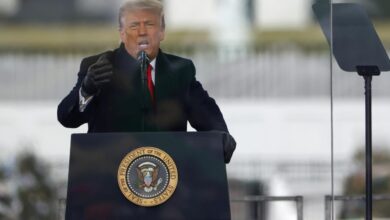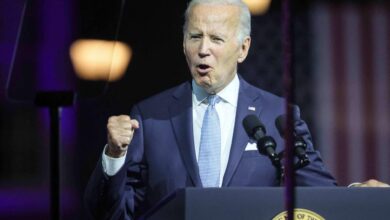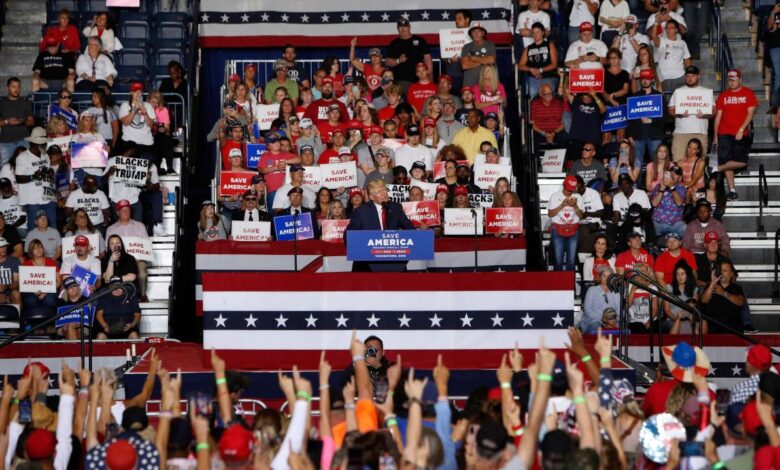
Can Donald Trump Use Songs Against a Musicians Will?
Can donald trump use songs against a musicians will – Can Donald Trump use songs against a musician’s will? This question delves into the fascinating intersection of copyright law, political campaigning, and the rights of artists. We’ll explore the legal battles, the public outcry, and the murky world of music licensing in the context of presidential campaigns. Get ready for a deep dive into the complexities of fair use, the power of popular music, and the lengths politicians will go to for a catchy tune.
From analyzing the legal precedents surrounding unauthorized music usage in political campaigns to examining specific instances where Trump’s campaigns have faced criticism, we’ll uncover the nuances of this ongoing debate. We’ll also explore the roles of digital platforms in enforcing copyright and the impact of such actions on public perception. It’s a story filled with legal battles, public outrage, and a whole lot of music.
Copyright Law and Fair Use
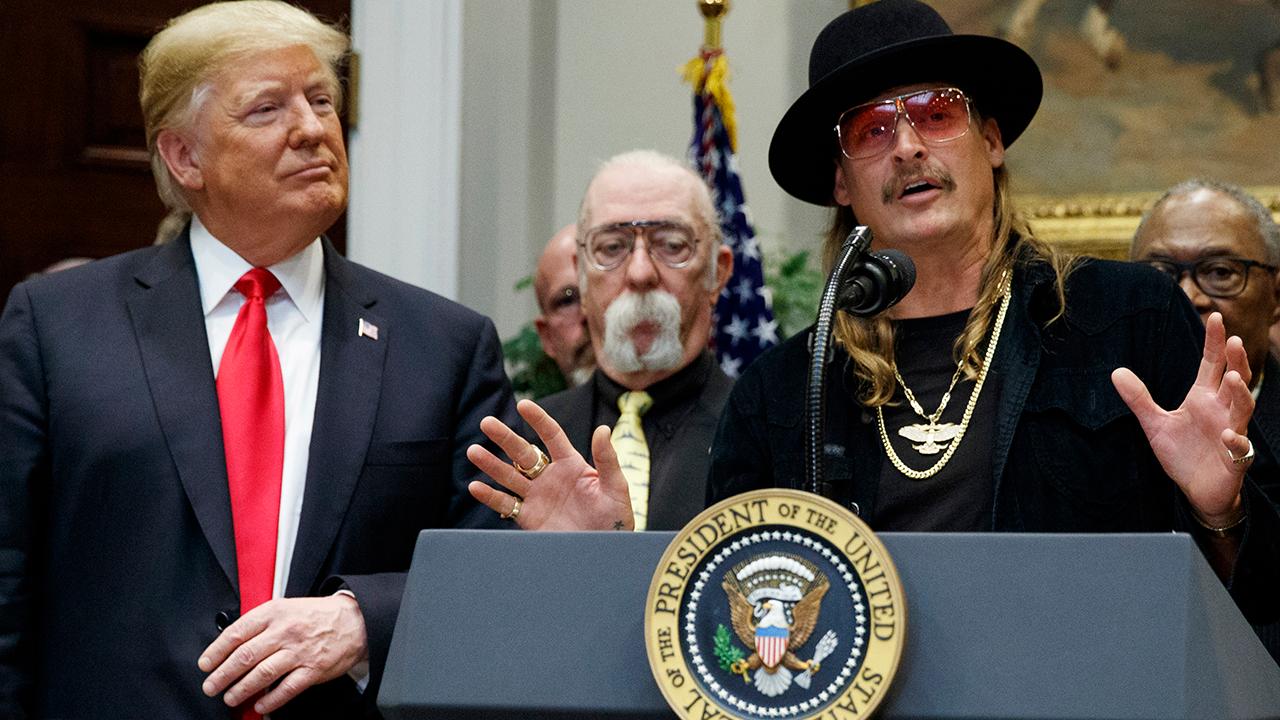
Copyright law protects the rights of creators of original works, including musical compositions. This protection grants creators exclusive rights to reproduce, distribute, display, perform, and create derivative works based on their creations. For musical works, this means that only the copyright holder (or someone with their permission) can legally use the music in various ways, such as in a political campaign.
Unauthorized use can lead to copyright infringement lawsuits.
The Legal Basis of Copyright Protection for Musical Works
Copyright protection for musical works arises automatically upon creation of a fixed tangible form of the work, such as a recording or sheet music. Registration with the U.S. Copyright Office is not required for protection, but it offers several advantages, including the ability to sue for statutory damages and attorney’s fees in infringement cases. The Copyright Act of 1976, as amended, governs the scope and duration of copyright protection in the United States.
This law establishes the exclusive rights of copyright holders and provides mechanisms for enforcement. It’s crucial to understand that the duration of copyright protection is significant, often extending for decades beyond the creator’s lifetime.
The Four Factors of Fair Use in Political Campaigns
Fair use is a legal doctrine that permits limited use of copyrighted material without permission from the copyright holder. In the context of political campaigns, the use of music often falls under scrutiny. The four factors courts consider when determining fair use are:
1. The purpose and character of the use
Is the use transformative (adding new meaning or message)? Non-commercial use is favored. A political campaign using a song to create a specific political message might be considered transformative.
2. The nature of the copyrighted work
Is the work creative or factual? Published works generally receive less protection. The originality and creativity of the musical work are relevant here. A highly creative and original song is less likely to be considered fair use.
3. The amount and substantiality of the portion used
How much of the original work was used? Using a small portion is more likely to be considered fair use than using the entire song. Using a short, recognizable segment may still be problematic.
4. The effect of the use upon the potential market for or value of the copyrighted work
Does the use harm the market for the original work? Using a song in a campaign might reduce sales or licensing opportunities for the original artist.
So, the whole Donald Trump using songs against artists’ wishes thing got me thinking about power dynamics. It’s a blatant disregard for individual rights, much like the ongoing debate surrounding fair treatment for transgender prisoners, highlighted in this article americas growing row over policies for transgender prisoners. Both situations boil down to a larger question of who gets to decide what’s right and who gets to wield that power; it’s a worrying trend when basic rights are so easily disregarded.
Examples of Court Cases Involving Unauthorized Music Use in Political Campaigns
While specific cases involving the exact scenario of a presidential campaign using music without permission are not readily available in published legal databases due to settlements and confidentiality, numerous cases exist regarding unauthorized music use in political contexts. These cases generally highlight the difficulties in balancing free speech rights with copyright protection. Many cases involve smaller campaigns and local elections where the financial stakes and legal resources are significantly lower, resulting in settlements rather than extensive litigation.
The legal precedent set by these cases often revolves around the application of the four fair use factors.
Comparison of Fair Use Application to Different Types of Musical Usage
The application of fair use varies significantly depending on how much of the song is used. Using a short excerpt, even a recognizable one, might be more easily defensible as fair use than using the entire song. However, even short excerpts can be problematic if they are the most distinctive and commercially valuable parts of the work. The transformative nature of the use becomes increasingly crucial when larger portions of a song are used.
A transformative use might justify the use of a larger portion than a non-transformative use.
Key Elements of Copyright Law Relevant to Unauthorized Music Use in Political Campaigns
| Element | Description | Relevance to Political Campaigns | Potential Outcome of Infringement |
|---|---|---|---|
| Copyright Ownership | The legal right granted to the creator of an original work. | Determines who can authorize use of the music. | Infringement lawsuits, injunctions, damages. |
| Exclusive Rights | Rights granted to the copyright holder to control reproduction, distribution, etc. | Campaign use without permission violates these rights. | Financial penalties, legal fees. |
| Fair Use Doctrine | Limited exception to copyright allowing use without permission under specific circumstances. | Courts assess the four fair use factors to determine if campaign use is permissible. | May negate infringement if all four factors favor fair use. |
| Statutory Damages | Fixed amounts awarded in copyright infringement cases, regardless of actual damages. | Significant potential penalties for campaigns found liable. | Can be substantial, even if no actual financial harm is proven. |
Trump’s Use of Music in Campaigns
Donald Trump’s presidential campaigns have been marked by a controversial approach to music licensing, frequently employing popular songs without securing the necessary permissions. This practice has led to numerous disputes with musicians, record labels, and copyright holders, highlighting the complexities of intellectual property rights in the context of political campaigning. This section examines instances of unauthorized music use, the responses they provoked, and the potential legal implications.
Instances of Unauthorized Music Use
Trump’s campaigns have repeatedly used copyrighted music in rallies, advertisements, and online content without obtaining explicit permission from the copyright holders. Examples include the use of Neil Young’s “Rockin’ in the Free World,” the Rolling Stones’ “You Can’t Always Get What You Want,” and Queen’s “We Are the Champions.” These instances, among many others, demonstrate a pattern of utilizing popular music to enhance the emotional impact of his campaign events and messaging, often without regard for the legal ramifications.
Reactions of Musicians and Copyright Holders
The reactions of musicians and copyright holders to Trump’s unauthorized use of their music have been varied, ranging from outright condemnation to legal action. Many artists have publicly expressed their disapproval of their music being associated with Trump’s political platform, citing disagreements with his policies and rhetoric. Some have actively pursued legal action to prevent further use of their work, while others have opted for public statements of protest.
The responses highlight the strong emotional connection many artists have with their music and their desire to control how it is used.
Timeline of Significant Events, Can donald trump use songs against a musicians will
A precise timeline of every instance of unauthorized music use and subsequent reaction would be extensive. However, several key events illustrate the recurring nature of this issue. For example, the use of “Rockin’ in the Free World” in 2016 generated significant media attention and prompted a public statement from Neil Young. Similar situations arose with other artists throughout both his 2016 and 2020 campaigns, with each instance generating varying levels of public and legal response.
The lack of consistent legal action against Trump, however, indicates a complex interplay of factors, including the cost and time involved in pursuing such cases.
So, can Donald Trump use songs against a musician’s will? It’s a complex copyright issue, especially considering the legal battles he’s already facing. The recent ruling where a judge in trump records case blocks special master from viewing materials with classified markings highlights how seriously courts take unauthorized use of materials. This raises questions about whether similar legal standards would apply to music usage and potentially impact Trump’s actions in this area.
Strategies Employed by Trump’s Campaign
Trump’s campaign appears to have employed a strategy of using popular music without seeking permission, relying on the potential difficulty and expense of pursuing legal action for individual copyright holders. This approach calculates that the benefits of using recognizable music to generate emotional impact outweigh the risks of potential legal challenges. The sheer volume of music used, combined with the resources required to track and address every instance, might have deterred some copyright holders from pursuing legal action.
This strategy, however, highlights a disregard for intellectual property rights and potentially establishes a precedent for future campaigns.
Hypothetical Legal Challenge: Scenario with “Born in the U.S.A.”
Imagine a scenario where Trump’s campaign uses Bruce Springsteen’s “Born in the U.S.A.” in a campaign advertisement without permission. Springsteen, a vocal critic of Trump’s policies, could initiate a lawsuit for copyright infringement. The case would hinge on whether Trump’s campaign’s use constituted fair use – a legal doctrine permitting limited use of copyrighted material without permission under specific circumstances.
Given the overtly political nature of the advertisement and the potential for commercial gain, a strong argument could be made against fair use. The court would weigh factors such as the purpose and character of the use, the nature of the copyrighted work, the amount and substantiality of the portion used, and the effect of the use on the potential market for or value of the copyrighted work.
Given Springsteen’s well-known opposition to Trump, the court might rule in Springsteen’s favor, awarding him damages and an injunction preventing further use of the song.
Licensing and Permissions
Navigating the world of music licensing for political campaigns can be tricky. Using a song without permission is copyright infringement, leading to potential legal battles and hefty fines. Understanding the licensing process is crucial for any campaign hoping to use music effectively and legally. This section will delve into the intricacies of obtaining the necessary permissions and the costs involved.The process of obtaining a music license for commercial use, including political campaigns, involves several key steps and considerations.
So, the whole Trump using songs without permission thing got me thinking about the limits of power. It’s a fascinating legal grey area, isn’t it? This reminds me of the political fallout surrounding Ilhan Omar, as seen in this article about her GOP challenger defending Israel’s decision to bar her entry: ilhan omars gop challenger defends israels decision to reject entry says she basically made herself an enemy.
Both situations highlight how individual actions can have major consequences, whether it’s a musician’s song or a politician’s stance. Ultimately, the question of who controls what remains a complex battleground.
First, you need to identify the copyright holder of the song. This might be the artist, the record label, or a music publishing company. Once identified, you’ll need to contact them directly or through a licensing agency to request permission to use their music. Negotiations will then begin, focusing on the scope of use (e.g., length of campaign, geographic area, media platforms), and importantly, the fee.
Types of Music Licenses and Their Implications
Several types of music licenses exist, each with different implications for campaign usage. A “synchronization license” grants permission to use a musical composition in synchronization with visual media, such as a campaign advertisement. A “master use license” covers the use of the specific recording of a song, as opposed to just the underlying musical composition. A “mechanical license” permits the reproduction of a musical work in physical or digital formats, often relevant for campaign merchandise or digital downloads.
The campaign’s intended use will dictate which licenses are required. Using a song in a TV ad requires both synchronization and master use licenses, while using it on a campaign website might only require a mechanical license if you are offering it for download.
Cost Variations in Music Licensing
The cost of obtaining music licenses varies considerably. Factors influencing cost include the song’s popularity, the length of the license term, the scope of use (e.g., national vs. local campaign), and the media platforms where the music will be used. A highly popular song used in a national television campaign will command a significantly higher licensing fee than an obscure song used in a local radio spot.
While precise figures are rarely publicly disclosed due to confidentiality agreements, it’s safe to say that costs can range from a few hundred dollars to tens of thousands, or even more, for major hits.
Examples of Licensing Agreements in Past Political Campaigns
Unfortunately, specific details of licensing agreements used in past political campaigns are generally kept confidential. However, it’s known that many campaigns utilize licensing agencies to streamline the process and ensure compliance. These agencies act as intermediaries, negotiating with copyright holders on behalf of the campaign and handling the legal paperwork. The use of such agencies suggests a significant investment by campaigns to avoid copyright infringement.
Publicly available information on licensing often centers around well-known instances of unauthorized use, highlighting the potential consequences of not securing proper licenses.
Steps Involved in Obtaining a Music License for a Political Campaign
Obtaining a music license requires careful planning and execution. Here’s a step-by-step guide:
- Identify the copyright holder(s) of the desired song.
- Contact the copyright holder(s) directly or through a licensing agency.
- Negotiate the terms of the license agreement, including usage rights, geographical limitations, and licensing fees.
- Review and sign the license agreement.
- Pay the licensing fee.
- Obtain written confirmation of the granted license.
- Maintain accurate records of the license agreement.
Public Perception and Impact: Can Donald Trump Use Songs Against A Musicians Will
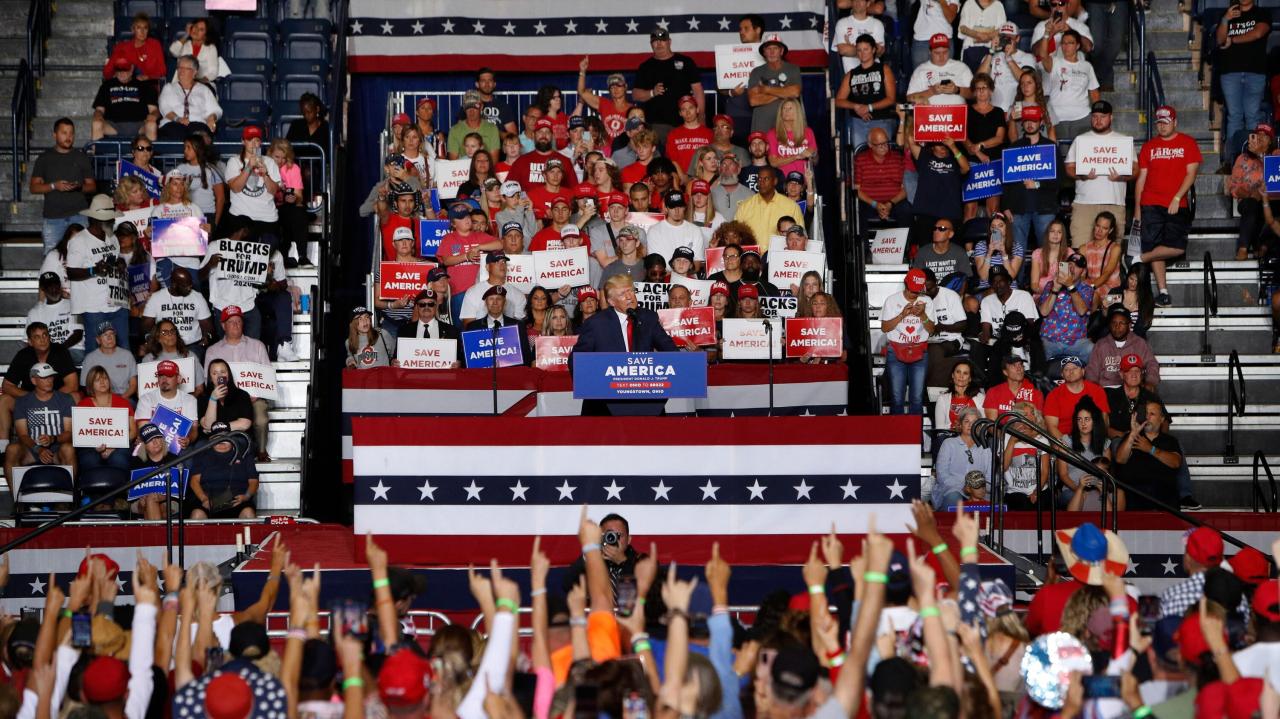
The unauthorized use of music in political campaigns generates a complex interplay of legal, ethical, and public relations consequences. Public reaction is often swift and highly dependent on the specific song, the artist’s stance, and the overall context of the campaign. The impact can be significant, affecting both the candidate and the musician involved.The public’s response to unauthorized music use is frequently one of divided opinion.
Some may find the use humorous or even clever, especially if the song’s message seems to align (or ironically clash) with the candidate’s platform. Others, however, react with outrage, particularly if the artist publicly expresses their disapproval. This response is amplified through social media, often leading to viral discussions and significant online engagement, both positive and negative. The intensity of the reaction is directly proportional to the song’s popularity and the artist’s influence.
Public Response to Unauthorized Music Use
Public reaction ranges from amused indifference to vocal outrage. For example, the use of a well-loved, iconic song might generate widespread positive attention if it resonates with the campaign’s message, even without permission. Conversely, the unauthorized use of a song by an artist known for their outspoken political views opposing the candidate could lead to a massive backlash against the campaign.
This backlash can manifest as boycotts, negative press coverage, and a decline in public support for the candidate. The reaction is also influenced by the perceived intent behind the unauthorized use; a seemingly accidental or unintentional use might receive a more lenient response than a blatant disregard for copyright.
Impact on Campaign Image vs. Musician’s Reputation
The impact of unauthorized music use varies greatly depending on the circumstances. A campaign’s image can be severely damaged if the public perceives the action as disrespectful or legally questionable. This damage can extend beyond the immediate controversy, potentially affecting the candidate’s credibility and electability. On the other hand, the musician’s reputation might be minimally affected if the unauthorized use goes unnoticed or if the public largely supports the candidate’s use of their music.
However, if the artist actively condemns the use, their reputation might remain unaffected or even be enhanced by their demonstration of principle. Conversely, an artist’s reputation could be negatively affected if the public perceives them as overly sensitive or litigious, particularly if they are seen as hindering a popular political campaign.
Consequences for Campaigns Using Music Without Permission
Using music without permission exposes campaigns to significant legal and financial repercussions. Copyright infringement lawsuits can result in substantial fines, potentially reaching hundreds of thousands or even millions of dollars depending on the song’s popularity and the extent of the infringement. Beyond financial penalties, legal action can severely damage a campaign’s credibility and distract from core campaign issues.
Such legal battles can also consume valuable time and resources, potentially diverting attention and funds away from more pressing campaign activities. In extreme cases, a court could order the campaign to cease using the music and issue a public apology.
Media Portrayal of Unauthorized Music Use
The media plays a crucial role in shaping public perception of unauthorized music use in political campaigns. News outlets often highlight the legal aspects of the situation, reporting on lawsuits, settlements, and potential penalties. The media also focuses on the public’s reaction, showcasing both positive and negative responses. Depending on the news outlet’s political leaning, the coverage might be framed favorably or unfavorably towards the campaign or the artist involved.
Social media platforms further amplify these narratives, contributing to a rapid spread of information and opinion, sometimes leading to misinformation or biased interpretations.
Hypothetical Scenario and Effects on Public Opinion
Imagine a scenario where a popular country music artist, known for their strong liberal views, discovers their hit song, “Freedom’s Call,” is being used without permission in a conservative presidential campaign. The artist immediately issues a cease-and-desist letter and publicly condemns the campaign’s actions, describing it as a blatant misrepresentation of their work and values. The media covers the story extensively, with some outlets focusing on the legal battle and others highlighting the artist’s political statement.
Social media explodes with opinions, with many supporting the artist’s stance and criticizing the campaign’s disregard for copyright and artistic integrity. This scenario could significantly damage the campaign’s image, alienating potential voters and potentially costing them support among independent and centrist voters. The campaign might be forced to issue a public apology and remove the song from their materials, further damaging their credibility.
Conversely, the artist might experience a surge in popularity, further solidifying their reputation as a principled and outspoken artist.
Digital Platforms and Music Usage
Digital platforms like YouTube, Spotify, and others play a crucial role in the global dissemination of music, both legally and illegally. Their reach and influence make them key players in the ongoing battle over copyright infringement and the fair use of copyrighted material. Understanding their involvement is critical to grasping the complexities of music usage in the digital age, particularly within the context of political campaigns.Digital platforms have a significant responsibility to ensure that copyrighted music is not used without permission on their services.
This responsibility stems from copyright law, which grants creators exclusive rights to control the reproduction and distribution of their work. Failure to address unauthorized use can lead to legal action and damage the platforms’ reputation. The sheer volume of content uploaded daily makes this a monumental task, requiring sophisticated technological solutions and proactive legal strategies.
Copyright Detection and Removal Mechanisms
Digital platforms employ a variety of mechanisms to detect and remove copyrighted material. Content ID, a system developed by YouTube, is a prime example. This technology compares uploaded audio and video against a vast database of copyrighted works. If a match is found, the platform can take various actions, including blocking the video in certain territories, muting the audio, or issuing a copyright strike against the uploader.
Other platforms use similar systems, though the specifics of their algorithms and enforcement policies vary. These systems often involve fingerprinting technology, which creates a unique digital signature for each song, allowing for efficient identification even with variations in audio quality or edits. Human review also plays a role, particularly for borderline cases or appeals against automated takedown notices.
Platform Policies on Copyrighted Music in Political Campaigns
The policies of different digital platforms regarding the use of copyrighted music in political campaigns differ. While all platforms aim to comply with copyright law, their approaches to enforcement and permissible uses can vary. Some may be more lenient in allowing copyrighted material for political purposes, possibly considering it as a form of fair use under certain circumstances, while others maintain a stricter stance, removing any content flagged as infringing regardless of context.
This inconsistency creates a complex legal and practical landscape for political campaigns, who must navigate the varying requirements of each platform to avoid potential legal issues.
Comparison of Platform Policies
| Platform | Copyright Enforcement | Political Campaign Considerations | Dispute Resolution |
|---|---|---|---|
| YouTube | Content ID system, manual review, copyright strikes | Generally enforces copyright, but some allowances for fair use arguments may be made on a case-by-case basis. | Appeals process for copyright claims. |
| Spotify | Relies heavily on licensing agreements with rights holders; removes unlicensed content. | Strict enforcement of licensing agreements; unlikely to make exceptions for political campaigns. | Direct contact with Spotify’s copyright team. |
| Facebook (Meta) | Automated systems and manual review for copyright infringements. | Similar to YouTube, enforces copyright but may consider fair use arguments depending on the context. Political ads often require separate licensing agreements. | Copyright infringement reporting and appeals process. |
So, can Donald Trump (or any political campaign) use songs against a musician’s will? The answer, as we’ve seen, is complicated. It hinges on the often-blurred lines of fair use, the effectiveness of copyright enforcement, and the willingness of artists and platforms to take action. The legal battles, public pressure, and evolving digital landscape all play crucial roles in determining the outcome.
Ultimately, the question isn’t just about the legality, but also about the ethics and the impact on artists and the public’s perception of the campaign itself. It’s a debate that’s likely to continue as long as catchy tunes and political ambitions collide.

